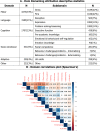The creation of the Global Scales for Early Development (GSED) for children aged 0-3 years: combining subject matter expert judgements with big data
- PMID: 36650017
- PMCID: PMC9853147
- DOI: 10.1136/bmjgh-2022-009827
The creation of the Global Scales for Early Development (GSED) for children aged 0-3 years: combining subject matter expert judgements with big data
Abstract
Introduction: With the ratification of the Sustainable Development Goals, there is an increased emphasis on early childhood development (ECD) and well-being. The WHO led Global Scales for Early Development (GSED) project aims to provide population and programmatic level measures of ECD for 0-3 years that are valid, reliable and have psychometrically stable performance across geographical, cultural and language contexts. This paper reports on the creation of two measures: (1) the GSED Short Form (GSED-SF)-a caregiver reported measure for population-evaluation-self-administered with no training required and (2) the GSED Long Form (GSED-LF)-a directly administered/observed measure for programmatic evaluation-administered by a trained professional.
Methods: We selected 807 psychometrically best-performing items using a Rasch measurement model from an ECD measurement databank which comprised 66 075 children assessed on 2211 items from 18 ECD measures in 32 countries. From 766 of these items, in-depth subject matter expert judgements were gathered to inform final item selection. Specifically collected were data on (1) conceptual matches between pairs of items originating from different measures, (2) developmental domain(s) measured by each item and (3) perceptions of feasibility of administration of each item in diverse contexts. Prototypes were finalised through a combination of psychometric performance evaluation and expert consensus to optimally identify items.
Results: We created the GSED-SF (139 items) and GSED-LF (157 items) for tablet-based and paper-based assessments, with an optimal set of items that fit the Rasch model, met subject matter expert criteria, avoided conceptual overlap, covered multiple domains of child development and were feasible to implement across diverse settings.
Conclusions: State-of-the-art quantitative and qualitative procedures were used to select of theoretically relevant and globally feasible items representing child development for children aged 0-3 years. GSED-SF and GSED-LF will be piloted and validated in children across diverse cultural, demographic, social and language contexts for global use.
Keywords: Child health; Other study design; Paediatrics.
© Author(s) (or their employer(s)) 2023. Re-use permitted under CC BY. Published by BMJ.
Conflict of interest statement
Competing interests: None declared.
Figures
References
-
- LeVine RA, New RS. Anthropology and child development: a cross-cultural reader. Wiley, 2008.
Publication types
MeSH terms
Grants and funding
LinkOut - more resources
Full Text Sources
Miscellaneous


